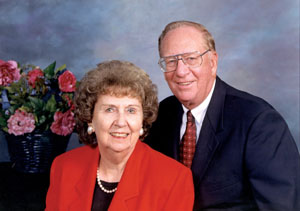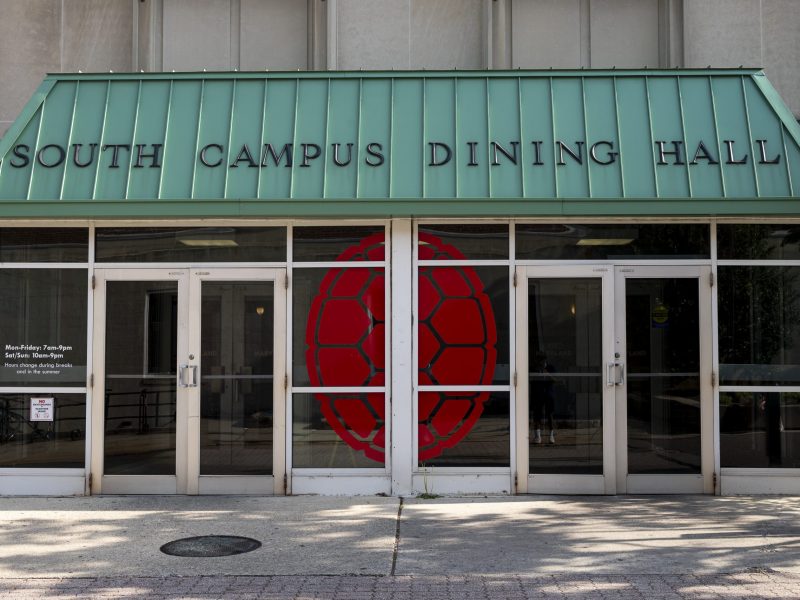Former University System of Maryland Chancellor Brit Kirwan has fond memories of a lunch with his longtime friend Cliff Kendall in October.
Kendall, already a prominent donor to the system, took Kirwan out to eat after hearing of a fundraising campaign that was in the works.
“I have a feeling this is going to be a very expensive lunch for me,” Kirwan, also the co-chair of the University of Maryland’s capital campaign, remembers Kendall saying.
By the end of the meal, Kendall had committed a significant donation to this university’s campaign, Kirwan said.
“Brit, as long as you’re asking me for help for students, I can’t say no,” Kendall said, according to Kirwan.
Kendall, a D.C.-area businessman who gave millions in donations to the university system to support need-based scholarships, died Wednesday after a brief hospital stay. He was 86.
His son, Clark Kendall, told Bethesda Magazine that his father had recently been diagnosed with pancreatic cancer.
Cliff Kendall and his wife, Camille, donated $3 million in 2007 to establish scholarships for students attending the Universities at Shady Grove, according to The Baltimore Sun. Kendall also chaired a fundraising effort to construct a new building for George Washington University’s business school.
He is known for co-founding Computer Data Systems Inc., where he worked as chairman and CEO. He also founded the Montgomery County Community Foundation and the Technology Council of Maryland.
Kendall, a graduate of this university, was a longtime chairman of the system’s Board of Regents.
[Read more: A USM proposal could change how some student fees are approved]
System Chancellor Robert Caret, who said he met Kendall in 1995, noted his importance to the system in a news release Thursday.
“Beyond his achievements as a business and civic leader or his role guiding the expansion of educational opportunities in Maryland, Cliff was a truly good, humane and gracious man, which is how his many friends will remember him,” Caret wrote in the statement.
Joshua Michael, who served as a student regent for the system during Kendall’s tenure, said he appreciated Kendall’s support for college affordability, including his work on a system textbook affordability policy.
During the 2008 economic recession, Kendall provided “steady yet visionary leadership” as the “backbone” of the system, he said.
Kirwan said Kendall’s leadership was crucial to keeping tuition affordable for Marylanders during this recession, as he fought for financial support at the state level.
“With him heading the board, I always had the feeling that … no matter what happened that we were going to come out on the other side strong as a system,” said Michael, then a student at the University of Maryland, Baltimore County.
University President Wallace Loh said Kendall was among those who took him to lunch after Loh was offered the post in 2010.
“He came across as very thoughtful, very considerate, eager for me to accept the offer and come to University of Maryland. He simply was incredibly welcoming,” Loh said. “I think it’s part of why I accepted the offer.”
Kendall, whom some described as a family man, was married to his wife for more than 60 years. The couple’s four sons all attended this university, Loh said.
Kendall was a big fan of Maryland sports, and a frequent attendee at basketball games, Loh said. Kendall was also a quiet supporter for the school’s transition from the ACC to the Big Ten, he added.
“I talked to him quietly and he got it and he supported it, even though the vast majority of the public did not,” Loh said. “He was there when I needed him the most, not just for that but for other issues as well.”
[Read more: Two UMD courses will have free online textbook access in the fall]
Kendall also played an instrumental role in creating the Universities at Shady Grove to provide a strong educational option for students in Montgomery County, Loh said, which was all part of his goal to make college more accessible.
The two didn’t agree on everything — Loh advocated for the above-ground construction of the Purple Line on the campus, while Kendall opposed it, Loh said. But even when they disagreed, Kendall handled it with grace, Loh said.
“Even though we had very opposing viewpoints on this, he listened respectfully to what I had to say,” Loh said. “[After the Board of Regents vote] he came up to me, shook my hand and congratulated me on the outcome even though he opposed the outcome. He symbolized in my mind some of the best values of this country.”
Even with all that he accomplished in life, Kendall remained modest, Kirwan said.
“He was such a humble person. Despite all of his success it was never about him,” Kirwan said. “My goodness, how we have benefited because he lived and because he cared so much about the university and its students.”



